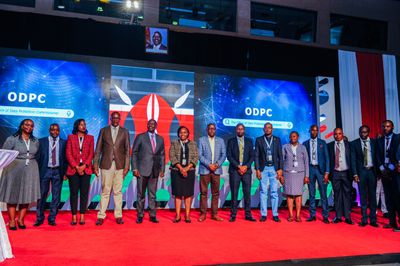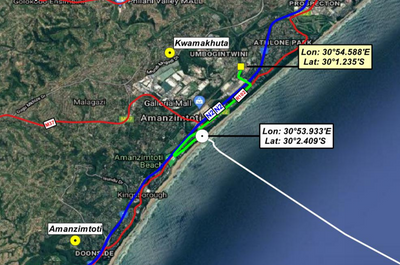By Tefo Mohapi
iAfrikan.com is in possession of evidence that points to equivocation and in some cases outright misinformation regarding the saga between Kenya's Angani Limited (its current board of directors and investors) and the company's co-founders, Brian Muita and Phares Kariuki.
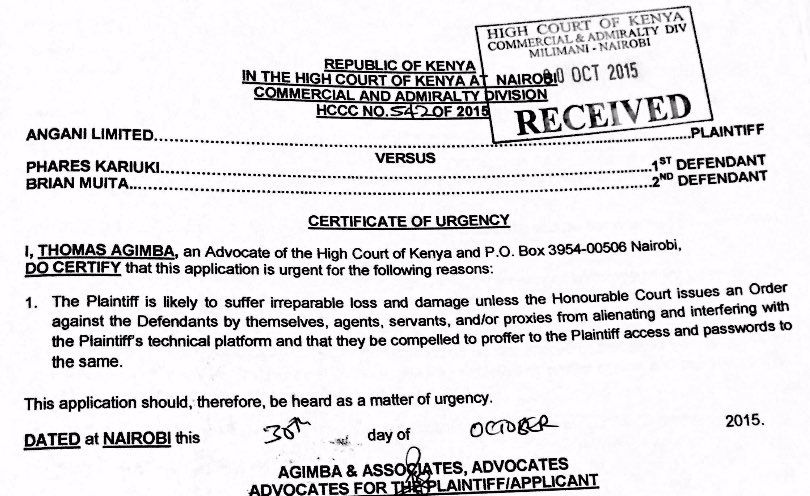
Brief history
Angani, which means “atmosphere” in Swahili, was founded in 2013 as a virtualized cloud platform by Kenyans, Phares Kariuki, and Brian Muita. This made Angani the first fully automated cloud infrastructure company in East Afrika.
Having bootstrapped their way to set up the company, things started looking up for Kariuki and Muita when, in February of 2015, the duo announced that they had attracted an undisclosed round of seed funding led by Invested Development with Africa Angels Network, Africa's Talking and Savannah Fund also participating.
The seed funding round, whose details were not disclosed, meant the addition of Erik Hersman (Ushahidi, BRCK & Savannah Fund), Riyaz Bachani (who had been appointed as COO of Angani in April 2014), and Miguel Granier (Invested Development) being appointed to the Angani Board of Directors to join Muita and Kariuki.
The company was growing and it all seemed rosy until the fateful day of 19 October 2015.
The board meeting
Despite brewing tension among the management team, there was no sign, publicly, of what was to come and follow the Angani Board of Directors meeting that took place on Monday, 19 October 2015.
Present at this meeting (based on the evidence we have verified) was:
- Erik Hersman, who connected via Skype to the meeting, BRCK CEO and Ushahidi Board member
- Phares Kariuki, at the time CEO
- Ripduman Sohan, Director (area of responsibility unknown)
- Brian Muita, CTO at the time
- Riyaz Bachani, COO
- Miguel Granier, who chaired the meeting, represents Invested Development and works with Erik at BRCK as he is on the BRCK Board of Directors
Various matters were discussed at the board meeting, including but not limited to Angani's administration-related matters but what was discussed at length was the matter of co-founder issues.
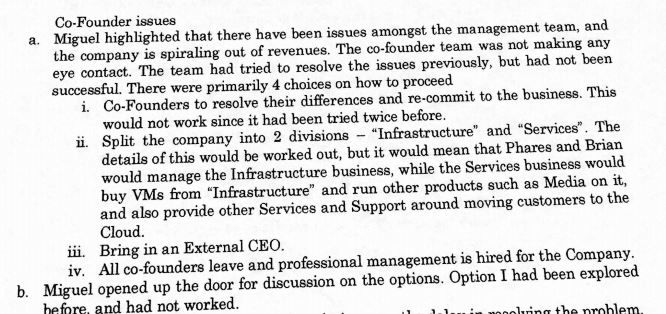
At the meeting, Granier highlighted the issues regarding co-founding team with the main issue seemingly being about them not all getting along and concerns about Angani spiralling out of revenues.
Apparently, all previous attempts to resolve the co-founding team's issues had failed, thus Granier tabled various options to be discussed and decided on. To summarise, these were:
- Dissolve current management and get consultants or external team to run the company or hire an external CEO to come in place of Kariuki.
- Peaceful resolution of issues by co-founders and carrying on with business as usual.
- Divide Angani into two companies, with one "division" being run by Kariuki and Muita and the other by Bachani and the rest of the management team. The "Bachani division" would then be dependent on the "Kariuki and Muita" division.
Without much discussion, Granier dismissed point 2. as not being feasible as previous attempts at peace had failed.
It is at this stage of the meeting it seems that it became apparent that the rest of the board of directors (except Muita) wanted to relieve Kariuki of his duties as CEO and retain Muita's services as CTO. With Sohan and Bachani explicitly having communicated to Muita their lack of confidence in Kariuki's leadership and Bachani stating that under Kariuki's leadership the company had not performed and thus grown accordingly.
This was an odd point raised by Bachani considering he had been given a good chunk of Kariuki's responsibilities dating back to April 2015. A point he emphasizes (yet contradicts himself in the meeting) by stating that since April 2015 the company had grown given his new responsibilities.
But they had underestimated Muita's loyalty and commitment to his co-founder as it would later in the meeting become apparent.
With the options tabled by Granier, Hersman suggested that the option of splitting the company would be a waste of time, and given that peaceful resolution had already been ruled out, it meant Hersman was all for the appointment of a new CEO.
At this point, it is alleged that Kariuki chipped in agreeing with Hersman, albeit for different reasons apparently, that the option of splitting the company would not work as there was already a "dark perception cloud" hanging over his head since he was labeled non-performing. Kariuki allegedly believed that this would hinder him in carrying out his duties in the new structure. Not only that, he is said to have countered with what he believed was the real issue why Bachani and Hersman wanted him out - i.e. he, Kariuki with the support of Muita, opposed (Route 2 Market) R2M being given shares at a discount, these shares were to come from their (Kariuki and Muita) own shareholding pool.
This, in essence, meant that Kariuki and Muita were effectively being arm twisted to give out their shares in the company.
Various discussions ensued in the fateful board meeting and it allegedly got to a point where Kariuki offered to resign.
As soon as it was clear that Kariuki was leaving as CEO, Muita announced, in the meeting, that he would leave too if Kariuki was no more CEO.
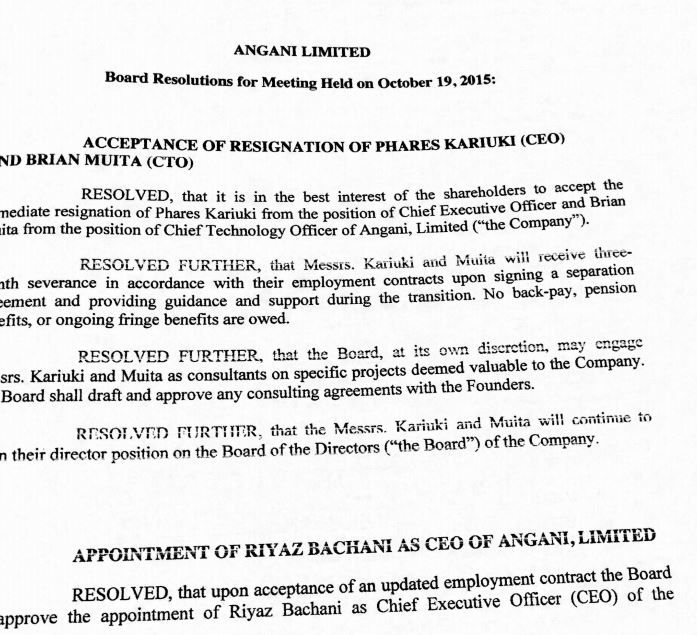
This presented the experienced remaining management team (as Hersman alludes here) with a dilemma: none of them had the experience or knowledge to do Muita's work, not to mention bring in the bulk of the Angani sales pipeline like Kariuki apparently did.
Bachani and Hersman's apparent strategy to divide Kariuki and Muita and conquer Angani swiftly after what they hoped would only be Kariuki's departure, had hit a hurdle.
The above also sheds light on the irony of Hersman's writing:
"The real meta-narrative of this story is one of inexperienced management and the subsequent irresponsible behavior of startup founders,"
Given that Hersman wrote about startup governance, it's surprising he also did not flag an extraordinary share issue from the board meeting.
What makes that R2M (Route 2 Market) issue an extraordinary share issue?
Rumor has it that Muita and Kariuki were being strong-armed into giving out a portion of their shares at an alleged 80% plus discount, is that good startup governance?
Passwords and clients
Just under seven days after the fateful board meeting on 19 October 2015, Bachani stated sending communications to Muita and Kariuki requesting passwords.
This is around about the same time unfortunately Angani experienced outages. At no point, based on the verified evidence we have reviewed did Kariuki nor Muita refuse to hand over passwords.
In fact, Muita continued to assist various Angani technical staff with various technical matters they required his assistance with. Including being in constant contact with Bachani during this period. Muita assisted with matters such as (based on the evidence we reviewed) password resets, restoration of some accounts, etc.
What caused the outage?
This has been well covered by Brenda Wambui in her Medium post last week where it emerged, post the board meeting, that the rest of the Angani board of directors decided to rope in consultants from Shape Blue to the tune of (apparently) over $20,000 who instead of being able to hack the system and gain root/admin access, made things worse.
But why did they go to such lengths instead of just asking Muita and/or Kariuki?
Muita and Kariuki had apparently asked Granier and Bachani for a letter stating that they will not be held responsible for any liability relating to the Angani platform once they had handed over all passwords and performed all the necessary hand over. Granier explicitly refused this, forcing Muita and Kariuki to send this request, in writing via their attorneys on 29 October 2015.
Granier again explicitly refused to do this and instead, the following day, Angani (through their attorneys, represented by Bachani) approached the High Court of Kenya in Nairobi to file an urgent matter that would be heard on 06 November 2015, the details of which cannot be disclosed.
At this point, it is important to state that at no point in all the evidence we have finely combed did we find any instance where either Kariuki, Muita, or their attorneys were refused to hand over passwords. As mentioned, instead, Muita was helpful and assisted technical staff at Angani and answered Bachani's communications whenever he could.
Riyaz Bachani & nepotism
During the period of the outage, Angani customers would have noted that communications from the company were coming from a certain Tabish Bachani, Riyaz Bachani's sister.
Tabish only came on board after the two co-founders were no more part of the company's management and were appointed by Riyaz Bachani to handle technical support. Given that the outages were intermittent and persistent with both Tabish and Shape Blue consultants on board at Angani (the situation even got worse), who was incompetent and not performing?
What did this tell us about Bachani's (Riyaz) management skills? (in appointing costly consultants who couldn't get the job done and the nepotism of appointing his sister at the expense of Kariuki and Muita)
Is this what an experienced CEO does?
What of Bachani's tenure as COO and failure (along with the board of directors) to identify system access control as a critical risk element and put in place processes and measures in place to ensure i would not be an issue?
Too much equity too early
Kariuki and Muita don't walk away from this smelling of roses like angels. They too need to take their fair share of responsibility.
For starters, giving out so much equity (despite actual numbers being disclosed) to allow for seed investors to have more control than the founders was, in hindsight, a big mistake they could have avoided had they not been naive.
Yes, funding events on the continent and in Kenya are few and far between but this doesn't mean you take whatever is tabled. Also, the golden rule seems to have also been missed by the two co-founders, i.e. do business with people who share the same vision as yourselves. Clearly in this case, not only did some of the seed investors not share the same vision as Kariuki and Muita, they also don't seem to have respected them at all, what with them publicly calling them out to be inexperienced and irresponsible.
The above falls squarely on Kariuki and Muita's shoulders, at the time, it was their equity to give away, they should have perhaps thought things through or sought trusted counsel.



